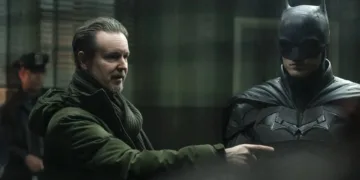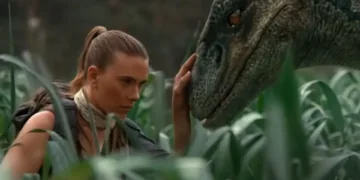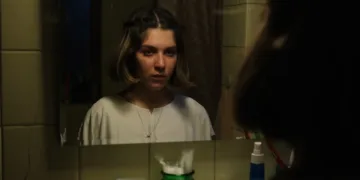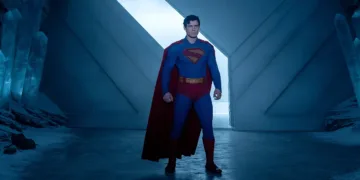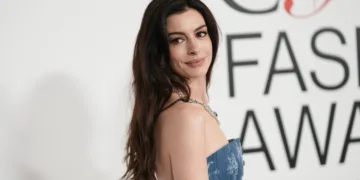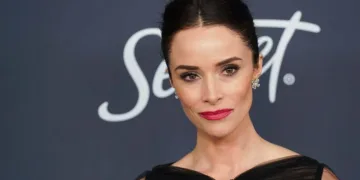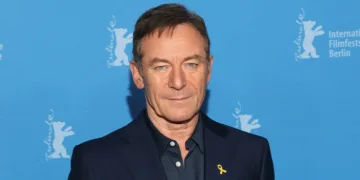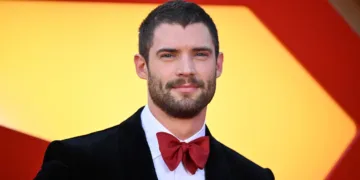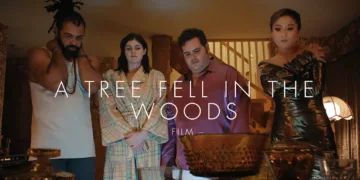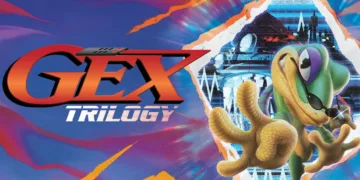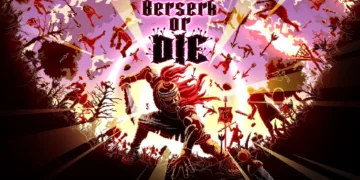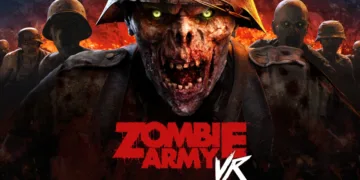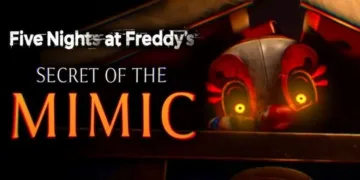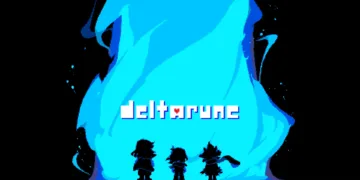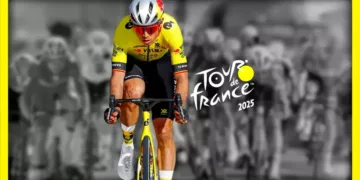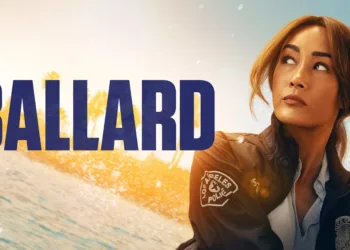Peter Cilella’s Descendent opens at the intersection of manhood and the unknown: a Los Angeles school roof at midnight, where security guard Sean Bruner (Ross Marquand) encounters a burst of phosphorescent spheres (yes, fatherhood can feel that surreal). Written and directed by Cilella, the film threads psychological drama with low-key science fiction—what one might call “domesday domesticity” (a new term, perhaps).
Sean is days away from becoming a father alongside his partner, Andrea (Sarah Bolger), whose calm assurance masks her own trepidation. Suddenly, a bright beam sends him tumbling into a hospital bed, brain bruised and memory fractured.
The film’s tone oscillates between tender family moments (bed-rest dinners, prenatal classes) and moments of primal disquiet: a sudden savant-like talent for sketching alien forms, inexplicable whispers echoing through walls, and visions of reptilian eyes in strangers’ faces.
This is not a hunting-alien thriller (no quick kill-shots here), nor a straight marriage drama—Cilella suspends us between two realities. What begins as a study of impending fatherhood metamorphoses into an inquiry about the limits of perception and the ghosts we carry. The stakes? A man’s sanity, a family’s bond, and perhaps the fate of humanity (a bit grandiose, but it feels that weighty).
Threads of Uncertainty
The narrative unfolds in three movements. In the ordinary world, Sean frets over health insurance and nursery décor while shadowed by hints of his own father’s suicide. Intimate dinner-table chatter gives way to furtive glances, as if his past is a silent guest.
Then comes disruption: the security-light malfunction, the white beam overhead, Sean’s violent fall—and his hospital awakening with no clear memory. (Some scenes are so quiet you can hear every bead of sweat.)
Finally, unraveling. Sean’s hands start producing elaborate paintings of biomechanical creatures; his ears pick up distant family gossip as if they were AM radio stations. The dog he loved as a child reappears—a comfort or another hallucinatory trick? Meanwhile, Andrea’s pregnancy encounters complications, heightening the claustrophobia.
At the film’s core floats a persistent question: was Sean truly snatched by extraterrestrials, or is he folding under the weight of generational trauma? Cilella sprinkles clues—snapshots of Sean’s mother dying in childbirth, his father’s own UFO–obsession—to seed doubt. As Sean confesses, “I can’t tell if I’m dreaming or awake,” the audience is forced into the same predicament.
Key motifs emerge: the alien as mirror (his art reveals inner fractures), light as omen (bright yet opaque), and silence as confession (quiet moments speak volumes about fear, expectation, and the fragility of mind).
Faces in the Flux
Ross Marquand’s portrayal of Sean charts a descent into what might be psychosis—or cosmic revelation. Early on, he’s tentative, a man who steps lightly through prenatal classes. Post-incident, every movement is charged: he twitches at distant sounds, jots feverish sketches in boardroom meetings, peers at Andrea with a mixture of wonder and panic. One moment he’s gripping a pencil; the next, he’s grasping for his own story.
Sarah Bolger brings Andrea alive as equal parts anchor and storm. She counsels Sean with practiced calm, only to find herself rattled when his eyes glaze over mid-reassurance. Her bathroom-floor breakdown—when Sean admits he’s “lost in some other place”—lands like a hammer.
Supporting roles sharpen Sean’s isolation: his best friend offers a gun for “protection” (guns and fatherhood—an uncomfortable historical echo of protector archetypes gone awry), while a counselor questions his sanity with clinical detachment. Even an “Aunt” figure (Susan Wilder) dismisses him as flaky, reminding us how men’s anxieties are too often brushed off as weakness.
Domestic tableaux (laughing over pasta, decorating a nursery) play against late-night solo sketches, underscoring how ordinary routines fracture when belief and disbelief collide. In these exchanges, Descendent probes trust—between spouses, between self and society, between what we perceive and what we refuse to accept.
The Art of Suspended Reality
Direction & pacing are exercises in controlled tension. Cilella avoids spectacle—he withholds full alien visuals, opting instead for brief, green-tinged bursts that feel as fleeting as memories. Cuts snap from domestic calm to surreal flashbacks, mirroring Sean’s own mental dissonance.
Cinematography turns light into character. The night sky’s orbs drift like ominous satellites; flashbacks bear a sickly green cast, a visual shorthand for the “other.” Close-ups linger on sweat beads, tear tracks, and reptilian-eye overlays—tiny details that suggest something drilling beneath the skin.
Sound design spotlights whispers and hums: distant family talk warps into conspiratorial static, then yields to Andrea’s cries in labor prep. Silence, too, is weaponized—empty rooms amplify Sean’s solitude.
Effects are tactile. The net-like membrane binding Sean on the alien table, the needle probing his skull—these moments deliver body-horror tension without blockbuster pyrotechnics.
The result is a film that feels grounded in everyday life yet haunted by unspoken cosmic echoes (a style I’d dub “existential-lite sci-fi”). It asks: when does the extraordinary invade the mundane—and who survives the translation?
Descendent premiered at the South by Southwest Film Festival on March 10, 2025, and is slated for a theatrical release later this year.
Full Credits
Director: Peter Cilella
Writer: Peter Cilella
Producers: David Lawson Jr., Justin Benson, Aaron Moorhead, Caleb Ward
Executive Producers: Arianne Fraser, Delphine Perrier, Henry Winterstern, Mark Ward
Cast: Ross Marquand, Sarah Bolger, Susan Wilder, Charlene Amoia, Dan O’Brien, Brandon Scott, Alexandra Barreto, Alex Ruiz, Clare Cooney, Emily Pendergast, Kyra Elise Gardner, Christina Mosti, Abby Wilson, Georgia Bishop
Director of Photography (Cinematographer): Alexander Chinnici
Editor: Jordan Goldstein
Composer: Tyler Strickland
The Review
Descendent
Descendent is a quietly unsettling fusion of domestic drama and alien lore, driven by Ross Marquand’s raw, shape-shifting performance and Peter Cilella’s artful restraint. Its deliberate ambiguity can frustrate (or provoke), yet its probing of fatherhood anxiety and inherited trauma lingers long after the credits roll. If you’re drawn to genre-bending films that prioritize mood and meaning over spectacle, this low-key abduction tale will both haunt and seduce.
PROS
- Ross Marquand’s transformative, emotionally charged lead performance
- Taut, atmospheric blend of domestic drama and subtle sci-fi
- Thoughtful exploration of fatherhood anxiety and intergenerational trauma
- Minimalist effects that heighten unease without spectacle
- Artful use of light, sound, and editing to mirror fractured perception
CONS
- Ambiguous resolution may leave some viewers unsatisfied
- Deliberate pacing risks feeling sluggish at times
- Secondary characters (beyond Sean and Andrea) under-utilized
- Sparse alien imagery might disappoint genre purists
- Narrative threads remain tantalizingly unresolved













